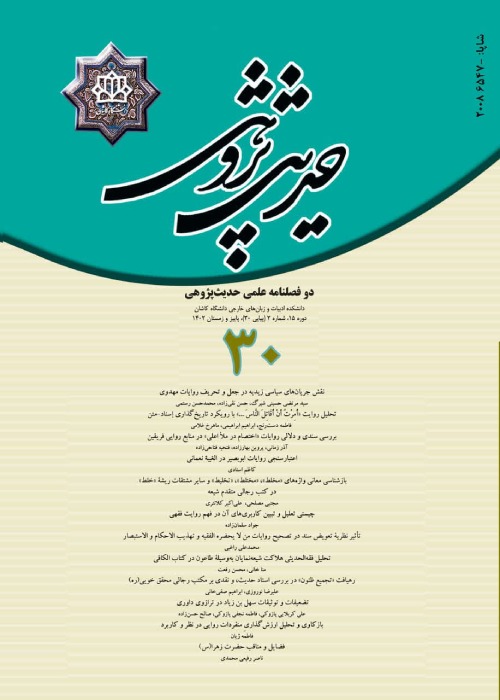Recognizing the meanings of the words "mukhalliṭ", "mukhtaliṭ", "takhlīṭ" and other derivatives of the root "khalaṭ" in the early Rijāl books of Shia
The authors of Rijāl books have used terms and expressions to introduce and identify people in the chain of asanid hadiths, which express their modification or revision. Knowing the correct and precise signified of these phrases and terms will help you to know the characteristics and conditions of the transmitters. Although some words and expressions have a clear meaning (such as liar, etc.), but some words and expressions of the ancients do not have a clear meaning and need to be explained. One of these terms is the word "mukhalliṭ" and its other derivatives, which are used in early Rijāl books of Shia in various forms such as "mukhalliṭ", "takhlīṭ", "khalaṭ" and etc. Recent Shia scholars and chroniclers have expressed different opinions in the definitions of these words, and there is even a difference between them in the meaning of these words on "Jarḥ", "Qadḥ" and "Dham". Therefore, it is appropriate to recognize the exact meanings of these terms.
The present research is based on the descriptive-analytical method and based on library sources to examine and recognize the meanings of the terms "mukhalliṭ" and its other derivatives (mukhalliṭ, takhlīṭ, khalaṭ) in the eraly Rijāl sources of Shia religious, that is, the books of: 1) Ekhtiaro Ma'rafater -Rejall Kāshshī, 2) al-Rijāl Ibn Al-Ghaḍā′irī, 3) Rijāl al-Najāshī, 4) al-Fihrist Sheikh Ṭūsī and 5) al-Rijāl Sheikh Ṭūsī. For this purpose, firstly, the words "mukhalliṭ", "mukhalliṭ", "takhlīṭ" and "khalaṭ", which are used in the early Rijāl books of Shia, to describe the transmitters or hadiths and books of hadith, were separated from each other. Then, under each of them, all the examples of these words in the early Rijāl sources were counted, and while paying attention to the lexical meanings, their exact definitions were analyzed.
The results of the research were that: the word "mukhalliṭ" is used only in the description of transmitters of hadiths and it means someone who narrates both valid and correct traditions as well as negative and unacceptable traditions. The word " mukhalliṭ " is sometimes used to describe hadith books, in which case it is an allusion to the inadmissibility of the contents of that book; Sometimes it is also used to describe transmitters, in one case (about Jabir ibn Yazid Ju'fi) it means having a bad memory, and in other cases it means the doubts of the early scholars in validating or weakening those transmitters."Takhlīṭ" is also used in most cases in the description of hadith books or hadiths of transmitters and it means corrupt, that is corrupt due to exaggeration. Of course, sometimes it is used in the description of transmitters, which in this case also means corruption in belief and opinion, or corruption in terms of his traditions. But the past participle or present participle of the root "khalaṭ" is also used in three meanings, which are: a- changing the opinion of a person of the Shiite religion, b- mixing the traditions of two hadith books or the Isnads of one book, c- socializing and sharing with others. According to these findings, it should be added that the definitions provided by late shia chroniclers face two shortcomings in defining the term "mukhalliṭ" and its other derivatives. One is that they have not distinguished between these words, and the other is that they have not paid much attention to the different lexical meanings of these words.
The words "mukhalliṭ", "mukhalliṭ", "takhlīṭ" and "khalaṭ", which the writers of the early Shia religious books used in the description of some hadith transmitters - contrary to the opinion of some recent shia chroniclers - do not have the same meaning; Rather, each of these, depending on their literal meanings, and whether they are used to describe the hadith transmitters or the hadith books of those transmitters, have a different meaning from the other. Therefore, hadith researchers should pay attention to the difference in the meaning of these words before judging about modification or weakness of the transmitters or traditions or books that are described with these words in Rijāl sources. Because it is not possible to reject all hadiths whose transmitters are described with some of these words (such as khalaṭ or mukhalliṭ).
- حق عضویت دریافتی صرف حمایت از نشریات عضو و نگهداری، تکمیل و توسعه مگیران میشود.
- پرداخت حق اشتراک و دانلود مقالات اجازه بازنشر آن در سایر رسانههای چاپی و دیجیتال را به کاربر نمیدهد.



